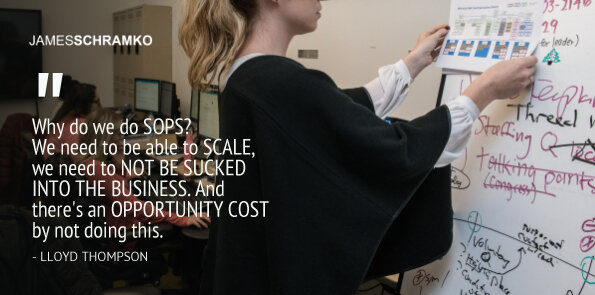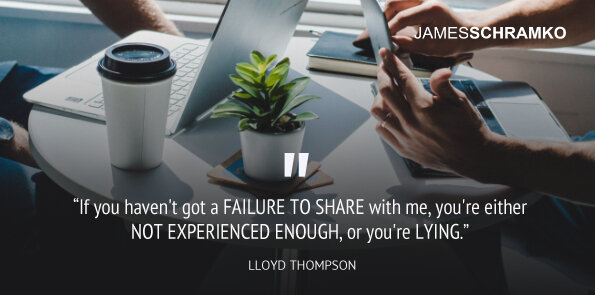Podcast: Download (Duration: 52:55 — 49.2MB)
Get Notified Of Future Episodes Apple Podcasts | Spotify | Amazon Music | Android | Blubrry | Gaana | TuneIn | Deezer | Anghami | RSS | More
Artificial intelligence is big in the news, with tools like ChatGPT changing the way people create content. How does this affect online business and, in particular, the human element?
James and VirtualDOO’s Lloyd Thompson explore the reality and the possibilities.
Our two experts talk about how using AI in business impacts existing teams.
They discuss whether using AI to write articles can be applied to SOP creation.
And they look at interview methods that challenge AI and require a purely human powered response.
Table of contents:
1. The burning topic of AI
2. A history of resistance to technology
3. Something that’s not going away soon
4. What it means for a team
5. Do you still say please?
6. Use AI with this caveat…
7. On the matter of SOPs
8. The impact of AI on hiring
9. Could this clause break the law?
10. How to get the right people
11. Referrals and filtering
12. Looking for an alignment
13. A tricky but revealing question
The burning topic of AI
It’s not rare for visionaries to have difficulty managing a team and the operations of their business. This is where Lloyd comes in. He’s helped many of James’s members with their manpower and systems.
Today’s topic is an interesting one: how the growing prevalence of AI tools could impact those components of a business. While there is speculation about whether AI is ready to replace jobs, its applications in content production and research are extensive and powerful.
Just recently, James has done episodes on the uses of AI in paid traffic and in marketing. As far back as six years ago, he was talking about it on the show, and a couple of years back looking at its possible application in copywriting.
James And Lloyd agree that AI is a topic that needs to be discussed as it becomes more mainstream.
A history of resistance to technology
Technology has not always been welcomed in society, reflects Lloyd. He recalls the Luddites of the industrial revolution, who felt their jobs threatened by the advances in machinery.
And in France, there were the workers who would toss their shoes, “sabots” into machinery in protest, hence the word, “sabotage”.
Can you imagine, says Lloyd, running a business today without the internet?
James can. He lived the pre-internet era. And interestingly, his great grandfather did similar work to his even earlier, with much less technology.
Something that’s not going away soon
The way Lloyd sees it, AI is here to stay and will become increasingly important in the future. He compares it to using the internet for business – non-users could be viewed as modern-day Luddites.
And competitors will be using AI, says James. The ease of entry for creating online content is greater now than ever, and using AI can give businesses an advantage.
While James recommends being selective about AI application, he does use it on a daily basis and believe it may become a regular tool like Google.
Now, he’d like Lloyd to apply an AI lens to the following topics in their conversation.
What it means for a team
First, James would like to acknowledge that AI will change things. And as regards his team, this will mean augmenting their performance rather than replacing them – he has in fact, already encouraged them to use Midjourney and other tools for image processing and video editing.
Lloyd recommends founders involve their team with AI, and start by perhaps interacting with ChatGPT as if it were a search engine.
Do you still say please?
Question, says James, do you still use manners with ChatGPT?
Do I say please? Says Lloyd. He does.
So does James.
With ChatGPT, there is the feeling more of having a conversation, they decide, as opposed to searching on Google. The former allows for continued iteration and prompts based on clear instructions, making it powerful and useful for content creation.
This highlights the importance of good communication to get the best results from AI.
Use AI with this caveat…
AI can be a powerful tool, but Lloyd warns people, it has its limitations and potential for error. Check the responses it gives you; see where it gets its information; use it with caution and context.
That said, for those who know how to use it effectively, AI can serve as a valuable supercharger for tasks such research and creating content.
On the matter of SOPs
James wants to talk about AI and SOPs.
A classic issue Lloyd encounters is, I hate writing SOPs (standard operating procedures), it’s so time-consuming. This from a founder.
In the first place, Lloyd and James agree, the founder should not be writing SOPs.
Why do we do SOPs? We need to be able to scale, we need to not be sucked into the business. And there’s an opportunity cost by not doing this, says Lloyd.
So who should write it? Ideally, a team member, and at least two people should be versed on the process.
Lloyd uses an I-We-You, Zoom and Loom procedure. He gets on Zoom with a team members, walks them through and records the process via Loom, then lets them write the SOP.
The next time the process happens, Lloyd lets the team member go through it, again on Zoom, letting Lloyd view via screen share. They can ask questions and update the SOP.
Finally, the process is handed over to the team member.
Lloyd realizes there are now AI tools for SOPs. And while they may document things faster, to his mind it is not replacing the teams’s involvement in the process.
The impact of AI on hiring
Next on the list of topics is hiring, and the possible effect of AI on the process.
In James’s opinion, although there are scheduling and AI candidate-side tools available to create resumes and portfolios, specialists who are good at what they do and who use the tools to work faster shouldn’t be concerned. On the other hand, low-level, white-collar roles and commoditized blue-collar roles could be at risk.
Knowing that certain tools can help job candidates pass tests they might otherwise fail, how does Lloyd think an employer can get their hiring right?
Lloyd thinks we should consider, is this something easily replaced with AI at this stage? And having made the decision to hire, we need to make sure these people have the right skills and match our values.
He likes to personalize the hiring process by asking what the candidate hopes to gain by working for him. And he adds as well his core values, because it’s important to him.
Could this clause break the law?
Lloyd also puts a filter clause in his job description, for candidate to prove they’ve read it entirely. It’s normally, tell me about your passions outside of work.
James asks whether it is legal to ask that, as it may lead to questions about marital status, age, and other factors that may be considered discriminatory in some countries.
He recommends using other methods to test if the candidate has read the job description, like asking them to reference the number 77.
In James’s own recruitment business, they’ve been asking VA candidates to answer tests that ChatGPT would be challenged to pass, like telling a story of a favorite trip with their family, or the like, something that wouldn’t break Philippine law. Even if the AI could make up a story, the interview could quickly uncover if it was true or not.
How to get the right people
Getting the right hires is an important topic for James, one on which he’s created an entire training. And he believes Lloyd is a pro at it.
Say you’ve got your job advertisement, says Lloyd (and you can use ChatGPT to help you make this). What he wouldn’t do straight off is post in on a jobs board, because there could be opportunities closer to home.
A bio hacker he spoke to recommended sourcing your community, say a special interest group, for someone who was interested in the position or had the needed skills. They would be both knowledgable and more motivated to work with you.
Tap your email list, suggests James.
Or ask your team, says Lloyd. They know the culture of your business and what it’s like to work for you.
Referrals and filtering
Lloyd might give his position advertisement to his team and ask if they know someone interested.
James has done this, and while it’s counterintuitive, he’s actually hired from team members’ families and seen it work out well.
As far as filtering, Lloyd likes the trial task.
Paid trial task, says James.
And there’s the interview, something AI is unlikely to replace soon. And it’s the best way to determine if people align with you and your values.
Looking for an alignment
Lloyd really looks for empathy as an early lens when hiring people. He likes to connect with people with heart and humor and empathy.
Is he concerned about hiring people who are just like him, asks James? That’s a common mistake of leaders.
Lloyd likes people who share his values. And while James celebrates the diversity of personalities in his team, they share a number of core traits that he believes is important.
A tricky but revealing question
Before closing, Lloyd would like to put in something more.
He likes to include his favorite question in the interview: What’s the biggest professional failure you’ve made? And how did you directly contribute towards that failure?
Lloyd loves that question, because, he says, if you haven’t got a failure to share with him, you’re either not experienced enough, or you’re lying.
It’s certainly a trick question, says James, and one unlikely to come up in research, which the younger generation is quite good at. He does caution against doing anything that doesn’t work towards the outcome you want – so keep questions appropriate, legal, and helpful in making the right decision.
James recommends listing the criteria you want in a hire, then scoring candidates during the interview. Afterwards, do your analysis, your second round of interviews, consult with other people, or do your reference checks – these are the absolute essentials.
And if you want to skip the work, you might get an agency to filter candidates for you, like James’s VA recruitment agency, VisionFind, does.
Should you need help with operations, anything people or systems-related, Lloyd is the person to talk to, at VirtualDOO.com.
Liked the show? Enjoy all the episodes when you subscribe on iTunes
Need help bringing your business vision to life? Look up Lloyd at VirtualDOO.com













Leave a Reply